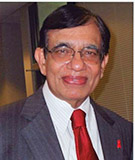
STRENGTHENING OF YOUR SELF-DEFENSE AGAINST DISEASES – Part X

Do all that heart-healthy advice about eating the right foods, exercising regularly, keeping an ideal body weight, and avoiding bad habits like tobacco and alcohol excess pay off in real life? Yes indeed, that’s what two recent studies originating from Boston’s Brigham and Women’s Hospital have shown. During the last several columns, I have explained all these in detail. Following is a quick summary and some take-home tips:
-
Eat well, live longer
Diet is the key for good health. “Let food be thy medicine” is what Hippocrates advised long ago and it’s still true. Eat primarily a vegetarian diet that contains at least 2 cups of fruits and 3 cups of vegetables. This will give you enough fiber and many essential nutrients. Do you know there are more than 600 million vegetarians today in the world? “Embracing vegetarianism” is an idea whose time has come! Also, keep your salt intake low - <2.5 gm / day for the normal and <1.5 gm daily for high- risk people. Eating too much salt contributed to 2.3 million heart-related deaths worldwide in 2010, 40 percent of them premature. Avoid refined sugars and cut down on sweets.
-
Exercise regularly
Are you doing 30 minutes of moderate aerobic exercise – brisk walking, treadmill, swimming, etc. – at least five days a week? Along with this, you must build mobility, muscle strength and joint flexibility. A fit person seems to have less illnesses and lower complications from surgery. Walking may be man’s best friend with or without a dog!
-
No abuses in any form
Tobacco abuse is the single most important preventable cause of death. Keep alcohol usage to a minimum — no more than 1-2 servings per day, preferably wine. Of course, no drug abuse, including pain killers or prescription drugs.
-
Maintain an ideal body weight.
Keep your BMI (Body Mass Index) below 25. For Indians, < 23 is ideal. Obesity and overweight are major risk factors for heart disease and cancer.
-
Control chronic diseases well
Hypertension, diabetes, hyperlipidemia and obesity are responsible for much of the heart and kidney diseases, strokes and some cancers prevalent in our society.
-
Save your skin from the sun
The UV rays from sun are quite damaging to your skin and eyes. The commonest form of cancer is skin cancer, especially in Florida. Use a sunscreen that has minimum SPF of 15 but one with 50 gives up to 97 percent protection.
-
Medication compliance is vital
When living with a chronic medical condition, managing your regular regimen of drugs is vital for wellness. To simplify this challenging task, create your own medication diary. Also, let your doctor know if you are taking alternate therapies (herbal remedies) simultaneously because of the interactions with allopathic drugs.
-
Practice mind control
Mind may be your most powerful tool and best ally for good health. There's consistent evidence that mindfulness and meditation reduce stress, depression, and anxiety, improves sleep, control blood pressure and diabetes and lead you to better heart health.
-
Don’t lie about your habits
Always tell the truth to your treating physician. Fitness trackers can identify how much exercise you have done in a week. New blood tests being developed can tell if you truly consumed your fruits and veggies as recommended.
-
Improve your health literacy
Learn more about health maintenance, wellness and prevention. There is strong evidence that the incidence of many serious diseases is less common in the educated compared to uneducated people.
-
Be technology savvy
The increasingly pervasive influence of technology in medicine means that with a computer or smart phone and with the right apps you can communicate with your doctor easily and understand your own health indices and track lab values easily.
-
Live your best life
Relax, be forgiving and think happy thoughts. Listen to music, especially spiritual music. It has always been part of human culture and can calm your mind, boost your mood and increase productivity.
-
Chose a good health insurance plan
Many consumers do not understand the basics of health insurance and are overwhelmed by the complexity of plan choices. Not all plans cover the preventive screening tests, some of the modern therapies considered experimental and certain costly drugs.
Remember most everyone struggles through life with some unfortunate disability. The success is to cope with it and push forward with hope and optimism.
M.P. Ravindra Nathan, M.D., is a cardiologist and Emeritus Editor of AAPI Journal. His book “Stories from My Heart” was recently released. (www.amazon.com or www.bn.com).